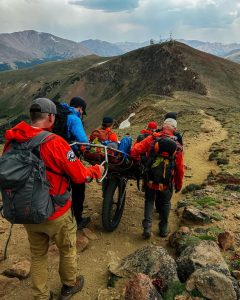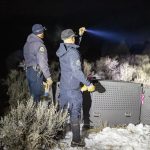Guest column: Processing grief together — turning tragedy into hope

Courtesy
The assassination of Charlie Kirk has left many of us stunned, heartbroken and angry. He was more than a commentator or organizer; he was a man who believed in the power of dialogue. He was outspoken, articulate and unafraid to express his convictions. And for that, his life was cut short.
It’s hard to process such senseless violence. Many of us are asking: Is this the new America? Have we entered a moment where anyone who dares to speak up risks their life?
When the news broke, my wife and I opened our home. We invited anyone who wanted to talk, grieve, or simply sit in silence. That night, friends and neighbors gathered around the fire. We asked questions we had no answers to, we cried for Charlie’s wife and children, and we mourned the fact that we live in a world where such hatred can thrive. In that circle, I was reminded of something powerful: grief is not just personal, it is communal.
When tragedy strikes, it can be tempting to push our grief down, to distract ourselves, or to let anger become the dominant emotion. But unprocessed grief has a way of surfacing in destructive ways — bitterness, division, or even despair.
Processing grief means naming the pain honestly, sitting with it — and refusing to ignore the wound. It also means moving beyond words and emotions into action. Doing something, however small, helps us take grief that feels unbearable and channel it into a form that brings life instead of more loss.
This is why communities gather at memorials, why people create foundations, why families light candles, and why neighbors bring meals. These actions are not meant to erase the sorrow — nothing can — but they give shape to our grief. They turn what is invisible and overwhelming into something tangible, something that moves us forward.
For 14 years, I lived in Israel, a nation that has tragically learned to navigate the pain of terrorism. Time and again, I saw families find a way to transform unimaginable grief into something life-giving.
I once spoke with a father whose daughter had been murdered by a terrorist. His response was not rage or retaliation. Instead, he chose to create a vineyard in her name. That vineyard became a living symbol of her life — bearing fruit, providing beauty and reminding the world that death does not have the final say.
That encounter shaped me deeply. It showed me that while grief can crush the spirit, it can also ignite a determination to bring light into the darkness. There is no way to erase the pain, but channeling it into something constructive allows us to honor the memory of those we’ve lost.
Now, as a community, we face a choice. Will we allow grief to harden into bitterness, anger, or fear? Or will we let it propel us toward hope, service, and healing?
My wife and I have decided to make a sizable gift to the Pregnancy Resource Center in Glenwood in Charlie’s name. We want to honor his legacy by supporting life. We also plan to plant a tree for him — something living, rooted, and enduring. These may seem like small actions, but they are tangible ways to say: his voice is not silenced.
You may find your own path. It might be gathering with neighbors for a shared meal. It could be an act of service, volunteering in his memory, or writing a note of encouragement to his family. Simple acts, repeated across a community, can transform grief into good.
Since Charlie’s death, social media has been flooded with opinions, arguments, and even celebrations of the tragedy. It’s overwhelming — and it can deepen our pain.
Daniel Kail of Trailhead Christian Counseling offered this advice:
Processing a loss and grieving can feel like a rollercoaster. And all of our rollercoasters look a little different. Ultimately, for each of us, it is an opportunity to explore ourselves and increase our understanding of who we are, the world, and our place in it.
It might be helpful to ask ourselves a question like, “What will my grieving produce within me and around me?” Above all, give yourself a high dosage or patience and grace as you wade through the deep waters, and if you are truly feeling lost, seek connection with people you trust or perhaps a professional.
One lesson I learned in Israel is this: healing doesn’t happen online. Healing happens face-to-face, in living rooms and around firepits, when people come together to listen, cry, and carry each other’s burdens. Social media has its place, but it cannot replace human presence.
If we want to honor Charlie, we must resist letting anger and fear spread unchecked. Instead, we can use our grief to create real human connection and to build up the people around us.
The assassination of a public figure is more than a personal loss — it is a test of our national character. If fear and hatred dictate how we live, then violence has the final word. But if we choose to turn grief into good, then hope wins.
So ask yourself: How would Charlie want to be remembered? What legacy can you build in his honor?
Charlie’s life, and now his death, remind us that conviction matters. Dialogue matters. Community matters. The best way to honor him is not by living in fear but by continuing to engage, continuing to build, and continuing to believe that light can overcome darkness.
Caleb Waller owns River Nest Resort, offering guests a unique hospitality experience. He also works in the financial industry, helping people manage their money. With past experience in politics, Caleb has been involved in advocating for policies that strengthen local communities and businesses. He lives in Silt with his wife, Kendra, and their seven children.

Support Local Journalism

Support Local Journalism
Readers around Glenwood Springs and Garfield County make the Post Independent’s work possible. Your financial contribution supports our efforts to deliver quality, locally relevant journalism.
Now more than ever, your support is critical to help us keep our community informed about the evolving coronavirus pandemic and the impact it is having locally. Every contribution, however large or small, will make a difference.
Each donation will be used exclusively for the development and creation of increased news coverage.









